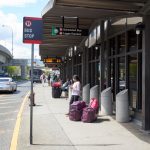Logan Airport Ground Access and Trip Reduction Strategy Study
Massachusetts Port Authority (Massport)
Many airports experienced record air passenger volumes in 2019 just prior to the COVID-19 pandemic. The rising popularity of air travel and ride-hailing apps both led to congested curb space and roads along with shifting revenue streams for airport operators. To address this curb congestion and meet statewide environmental regulation requirements, the Massachusetts Port Authority (Massport) sought to develop policies that would balance growing passenger volumes with reductions in the use of private vehicle access modes.
To develop these policies, RSG worked with Massport to conduct a series of studies examining the impact of potential airport ground access changes on high-occupancy vehicle (HOV) use. These studies looked at how each policy affected the airport’s congestion, revenue, and surrounding communities and environment. RSG worked closely with Massport to develop the studies’ comprehensive analytic framework. This framework evaluated various policies—including changes in services, pricing, and operations—to improve Logan’s ground access.
As part of this work spanning several years and tasks, RSG developed the Mode Choice Model and Simulator (MCMS) tool, which used data collected by RSG as part of a stated preference air passenger survey. With the MCMS, Massport can predict changes in ground access mode share for each set of policy changes. RSG’s work helped Massport plan for Logan’s current and future ground access needs by identifying achievable and impactful policy initiatives. As air travel rebounds, the MCMS can help airport operators evaluate policies to avoid a repeat of the congestion conditions experienced by many airports prior to the pandemic. This is particularly important since there is some evidence that the shift to private vehicles instead of transit may persist even after the pandemic recedes.
Related Reports & Publications



